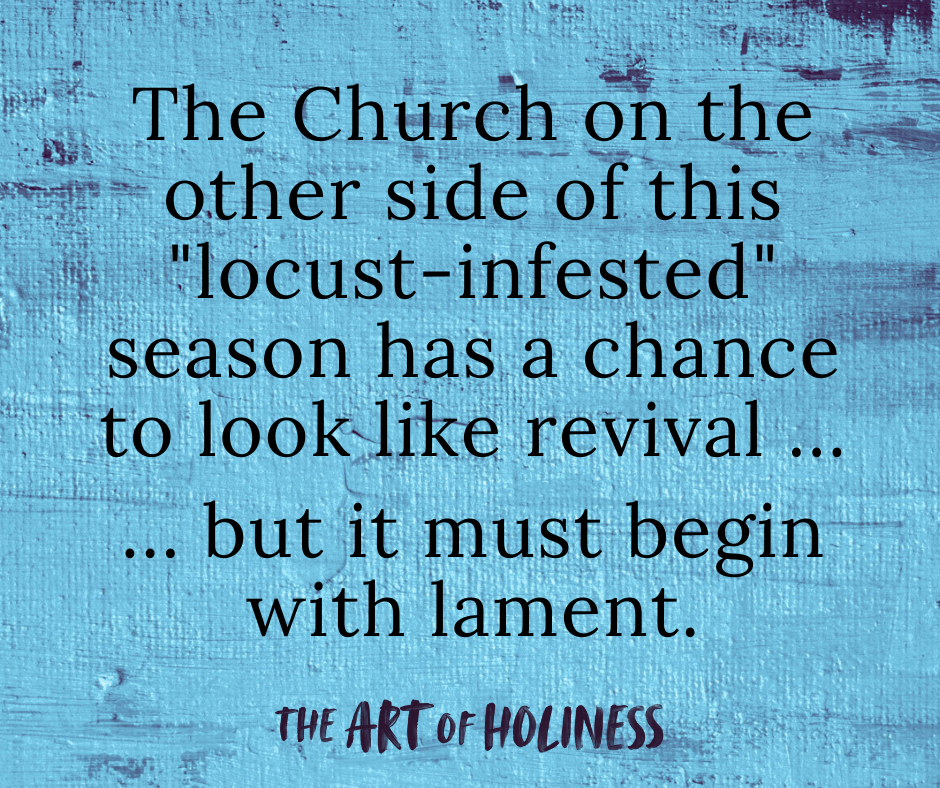Joel and Hosea begin the same way: “The word of the Lord that came to Hosea” … “the word of the Lord that came to Joel.”
If you are a prophet you should duck when you hear that line, because for the prophet it is a heavy blow. These days, we call things prophetic that we can’t remember past lunchtime. That’s not how it was for the Old Testament prophet. As Dr. Ricky Moore says, a simple “word of the Lord that came …” is code for, “Your life is about to change dramatically.”
Joel’s word began with a swarm of locusts. Locusts are no joke (Parts of Africa and Asia are currently experiencing the worst locust plague in 70 years. Billions of dollars worth of damage to crops in a region already dealing with food insecurities.), but Joel doesn’t assign blame or responsibility for them. His charge is to help the people respond rightly, so he invites them into lament, to cry out to God over the deep pain of their situation.
The people are told to put on sackcloth, declare a fast, mourn — all of which sounds a lot like repentance, but this is not that. Repentance may follow, but lament must come first. First, we must connect with the heart of God. Not his mind, but his heart.
As it turns out, when we don’t give the process of lament time to sort through the feelings and to feel them, we end up jumping too quickly in one false direction or another. We fall into shame on one end, or anger and blame on the other. And that mistake? That’s what you’re seeing on social media right now. We have forgotten to lament before we go casting stones.
Rend your hearts, Joel advises us. Before you jump to conclusions, let your heart break.
Joel tells us that we skipped a step. We have missed the biblical call to simply cry out — a cry generates in us a sympathy for the world and for all that is hurting right now. My friend, Lo Alaman, tells me that lament is the African slave singing in the field, “Swing lo, sweet chariot.” “Nobody knows the trouble I’ve seen.”
Biblical lament is always directed toward God. That’s what gives it its power. Lament is learning to turn our pain (for all that ought not be and all that ought to be but isn’t) toward God, rather than toward each other.
In other words, lament is giving space for God to shape our pain around his truth.
Bill Johnson has said (when talking about great moves of God) that our point is not to analyze a move of God but to be wrecked by the move of God. When it comes to lament, this point rings true. There is a biblical place for setting aide analysis and simply being wrecked before God.
So we lament the pain of 9/11 and the deep hurt for those who still suffer from its trauma.
And we lament the loss of trust we all suffered and the ways that distrust is reflected even today.
We lament the pain caused by how we treat race and skin color.
We lament the locusts — the real, actual locusts eating up the food of people in this world who were already hungry.
And we lament our disconnection with global pain.
And we lament this pandemic and the lives it has claimed — nearly a million as of this writing, with an average of 5000 people dying every day.
And, oh! how we lament all the older adults living in assisted living and nursing homes who have not been hugged by a family member in months.
And we lament the cancers and the hurricanes and the tornadoes.
We lament physical disability and sickness.
We lament the reality of abortion and the grief felt by those who never quite get over it.
We lament divorce and all its griefs and sorrows.
And we lament all these things, period. Without having to add a comma so we can assign blame or add our commentary. Our lament is a complete sentence that needs no offense or defense to be real and worth saying. It just is. We simply want our cry to surface before God so that God — the One Being capable of making any judgment — has a chance to shape our pain around his truth. Only when we have lamented properly can we move into the world rightly postured to expose what is most true.
Does it help to hear that there is grace for the space you’re in right now, especially if that space includes some sadness? Does it help to know you have permission to be in your sadness, to grieve without having to generate answers?
(Ranier Maria Rilke, the French poet, says, “Be patient toward all that is unsolved in your heart and try to love the questions themselves … live the questions.” Rilke seemed to understand lament.)
Ricky Moore, in his deeply relevant commentary on Joel, writes this: “Do we even realize that there is something emergent in our common life that should be moving us to tears, even to trembling? Are we seriously prepared to face the prospect of the end of life as we know it? Could this prospect move us to change the deepest part of ourselves, namely, our passions and posture toward God?”
In the act of lament, this is what we are after. We want to open our hearts like the flask of oil that woman broke open over the feet of Jesus, and pour out what is inside so we and God both can see what is really there. Only then are we ready to move toward repentance, to activism, toward solutions, toward hope.
The Church on the other side of this locust-infested season has a chance to look like revival, but it must begin with lament.








